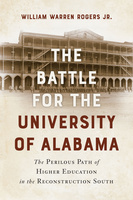Theatre Symposium, Vol. 32
Material Performance and Performing Objects
Theater Symposium, Volume 32 seeks to explore the collaborative interactions and ritual chains specific to performance during the collective reemergence into a hope filled post-COVID landscape. The contributors choose to engage this period of rebirth through an examination of the thriving and robust environment of material performance in all its facets. While vast in its diversity and by far the most popular aspect of object performance, puppetry serves as the guide into an even larger creative space of object performance styles and structures.
The Mann Phase
Hopewell Culture in Southwestern Indiana
This book provides a comprehensive overview of the Mann site in southwestern Indiana, which dates to 200‒600 CE and is one of the most consequential but enigmatic archaeological sites of the Middle Woodland period.
The Battle for the University of Alabama
The Perilous Path of Higher Education in the Reconstruction South
Traces the little-known story of the bitter contest for the fate of the University of Alabama after the Civil War
She's the Boss
The Rise of Women’s Entrepreneurship since World War II
Since World War II, women have moved increasingly into business ownership, often outpacing male start-ups and typically seeking to meet a combination of personal and economic needs. She’s the Boss chronicles the history of what drew so many women to entrepreneurship over the past eighty years so that today they own more than forty percent of all US businesses.
Secrets I Won't Take with Me
Home, War, and the Struggle for Peace in Israel
The story of the birth and evolution of modern Israel, especially concerning the struggle for Israeli-Palestinian peace, from the view of a journalist, politician and diplomat who wrote with his own hands several important chapters in that history.
Reframing Paquimé
Community Formation in Northwest Chihuahua
Based on twenty-five years of survey and excavation work in the Casas Grandes region, this book presents an interpretation of Paquimé that differs greatly from the traditional ideas that have dominated the literature for the last half-century. This massive reinterpretation of the inner workings of the Casas Grandes region tackles the essential question of how Paquimé affected its near neighbors and also addresses the enigmatic end to the great city. An essential archaeological text, Reframing Paquimé will generate debate for a generation of future scholars of Northwest Mexico and the adjacent U.S. Southwest.
Public Loves, Private Troubles
Migration, Technology, and Intimacy in Rural Indigenous Guatemala
Examines the role of digital technologies in the lives of Kaqchikel Maya women whose husbands work abroad
Producing Children
Critical Studies in Childhood Creativity
Children’s culture is not only culture for children; it’s culture by children — yet scholars of children’s culture overwhelmingly center work by adults for children. Producing Children acknowledges and theorizes children as cultural producers, underscoring how such creativity empowers children as active participants in their own culture, and helps us to reconceive our understandings of children themselves.
Producing Children
Critical Studies in Childhood Creativity
Children’s culture is not only culture for children; it’s culture by children — yet scholars of children’s culture overwhelmingly center work by adults for children. Producing Children acknowledges and theorizes children as cultural producers, underscoring how such creativity empowers children as active participants in their own culture, and helps us to reconceive our understandings of children themselves.
Organizing Professionals
Academic Employees Negotiating a New Academy
Academic employees are organizing and negotiating for respect for workers, their work, and the public value of higher education. Scholar and labor activist Gary Rhoades analyzes how academic employees are shifting the imbalance of power between labor and management, reducing the internal professional stratification between segments of the academic workforce, and intersecting workplace issues with broader issues of equality, public value, and social justice, and in the process organizing and negotiating for a new, more progressive academy.










